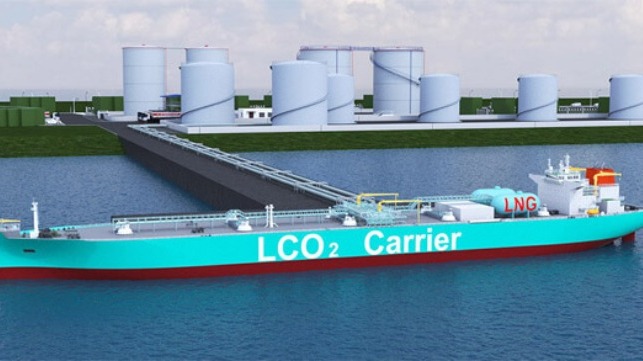Study to Explore Low Pressure/Temperature for Commercial Scale CO2 Shipping

A new research project looks to further define the parameters for CO2 shipping as they seek to scope out the elements needed for large-scale commercial shipping. While the shipping industry believes there is an emerging opportunity linked to the carbon capture and storage initiatives, the partnership highlights that the current design of liquified CO2 vessels has a limited storage capacity which is driving their research to develop solutions for industrial-scale shipping of CO2.
The partnership includes Mitsui O.S.K. Lines as well as some of Japan’s leading gas companies, including JX Nippon Oil & Gas Exploration Corporation and Osaka Gas Co. They will be joined by universities and researchers, including Future Energy Exports CRC Limited and Low Emission Technology Australia to launch the "LP Technology R&D Project." They plan to conduct research and development to demonstrate the technical feasibility and operability of low-pressure and low-temperature solutions for the bulk transport of CO2 by ships.
They point out that the current design of liquefied CO2 vessels has a limited storage volume due to their operating pressure and temperature (18 bar, -26 °C). Low pressures and low temperatures (approximately 7 bar, -49 °C) they believe will be one of the best options to significantly reduce costs for CO2 vessel design. However, they note that there is no record of liquefied CO2 transportation by ship under low pressure and low temperature conditions making it necessary to address the operational risks. They believe the research and demonstration project will enhance the likelihood of technical feasibility.
"We will make collaborative efforts with our project partners to develop a feasible CO2 bulk transportation method,” commented Yasuto Ariga, Executive Officer, General Manager, Sustainable Business Unit of JX NOEX. “In addition, we are taking this opportunity to build a good relationship with industry, government, and academia in Australia for its large potential CO2 sequestration capacity, and also promote cooperation with project partners for the realization of an overseas CCS project."

that matters most
Get the latest maritime news delivered to your inbox daily.
They plan to study the behavior and boil-off characteristics of liquid CO2 under dynamic operating conditions. They will conduct experiments using laboratory scale facilities (such as pressure cell and boil-off apparatus) to study the phase behavior and boil-off characteristics of liquid CO2 under dynamic operating conditions using the data to contribute to engineering models for CO2 boil-off and phase behavior calculations.
The information developed from this study they believe can also help to design pilot-scale Carbon Capture, Utilization, or Storage (CCUS) demonstration tests. All of this they believe can contribute to validating the engineering models that will be used for the large-scale shipment and storage of CO2 which plays a critical part in many countries’ plans to achieve net zero emissions.
